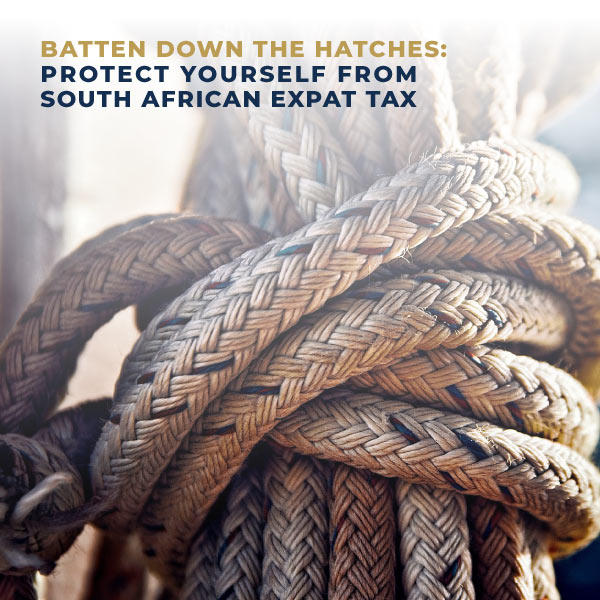SEAFARERS & YACHTIES: BATTEN DOWN THE HATCHES AND PROTECT YOURSELVES FROM SOUTH AFRICAN EXPAT TAX
We have dealt with the financial and tax affairs of hundreds of South African seafarers and yachties over the years, many of which have left South Africa at a young age to begin a burgeoning careers on the high seas or are veterans that are envisaging retirement in South Africa.
Unfortunately in both cases, the South African Revenue Service(SARS) knows that you are most likely not paying tax elsewhere on your foreign earnings; and with a home port that changes frequently, you are placed in a grey area in terms of which country you are tax resident of. In the past, proper tax planning and due diligence may have gone unpunished. However, with the new expatriate tax law now in full effect from 1 March 2020, if you are deemed to be tax resident of South Africa and do not qualify for the “seafarers exemption” – SARS has full taxing rights on that foreign income.
Implication of expat tax for South African seafarers and yachties
Most South African seafarers are already well aware that SARS is attempting to increase their revenue flow, due to a widely reported deficit in budget, and as such implemented the changes to the section 10(1)(o)(ii), more commonly known as “the expat exemption”, of the Income Tax Act No. 58 of 1962. This amendment now allows for SARS to tax expats claiming this specific exemption on their earnings above R1.25 million threshold, from 1 March 2020.
On 5 May 2020, SARS held a media briefing to announce a massive projected loss in revenue and are further below budget due to the COVID 19 outbreak and nationwide lockdown in SA resulting in the SA economy plummeting down to junk status. Furthermore, the rand is greatly weakening against foreign currencies and many local business’ being unable to operate due to the restrictions imposed in SA. Subsequently, the global situation will now mean that there is further emphasis on increasing revenue and enforcing tax compliance, as announce by SARS in the media briefing, and expats will now face a two-prong attack on their foreign earnings:
- Firstly, an emphasis by SARS on collection of revenue from Expats through the creation of the “Expat Task Force” and emphasis on the ability to use the common reporting standards (CRS) to cross check taxpayer declarations with their statements from global banking institutions. Unfortunately, the burden of proof lies on the taxpayer meaning the focus is on repercussions for non-compliance and collecting.
- Secondly, the falling rand has resulted in the R1.25 exemption becoming more and more meaningless, to those earning in a stronger foreign currency. Unfortunately, those that were below the taxable threshold may very well come above this and now have a tax liability in SA, whilst those who were already earning in excess of the exemption having a further liability on their earnings.
Silver Lining for seafarers & yachties
Many seafarers are in a fortunate position as they can claim alternate exemptions to the “common expat exemption” section 10(1)(o)(ii). This comes from special previsions made directed at Seafarers in the form of section 10(1)(o)(i)(aa) and section 10(1)(o)(i)(bb) exemption. The two “seafarer exemptions” allow for the employment remuneration earned to be fully exempt from taxation in SA, when met.
Simply put these exemptions are outlined as the below:
- Section 10(1)(o)(i)(aa) of the Act (“the first seafarer exemption”) – this exemption relates to officers or crew members onboard a vessel, with foreign employment, whereby the vessel is involved in international transportation of passengers/goods for reward and the taxpayer has met the days test requirement of being outside of SA for more than 183 days during any 12 month period over which the income was earned.
- Section 10(1)(o)(i)(bb) of the Act (“the second seafarer exemption”) – this exemption relates to officers or crew members onboard a vessel, whereby that vessel is engaged in prospecting; exploration; mining of minerals or production of minerals from the seabed’s outside of South Africa and the tax payer has met the days test requirement of being outside of SA for more than 183 days during any 12 month period over which the income was earned (not relevant to yacht crew).
Do not let SARS take the wind out of your sails; ignorance is not a legal argument
As the ownness of proof lies on the taxpayer according to South African tax law, it is important to ensure that you are within the bounds of the law and your income declarations are correctly made and any relevant exemptions are correctly claimed. An exemption is only given when claimed by the taxpayer, alternatively this income is seen as fully taxable. Subsequently, it is essential to claim the correct exemption and meet SARS legislation requirements on these declarations. Therefore, it may often be needed for a taxpayer to register for Provisional tax. This is particularly prudent now as the deadline for first payment on provisional tax is due on the 31st of August 2020.
Being required to submit a return as a seafarer or yachtie can be daunting due to the already complex world of expatriate tax law and a requirement to submit provisional tax returns only further complicates this. Therefore, it is important to have some level of understanding on what provisional tax is and the purpose of this, in order to appreciate the benefits associated with being a provisional taxpayer. Provisional tax is not distinguished from income tax but rather is merely a process in which a taxpayer is required to pay their tax liability in advance. This prevents the taxpayer from having to pay over one large amount of tax due on assessment in the proceeding tax filing season. The purpose of provisional tax is, therefore, to allow a taxpayer to pay income tax twice during the tax year in which the income is earned, specifically in the months of August and February in every tax year of assessment. This provides unique planning opportunities if you are diligent in your tax planning.
Closing remarks
Should a taxpayer be unsure of their liability or if they indeed qualify for an alternate exemption, it is best to contact experts in the field and ensure they are ticking all the right boxes and meeting their legal obligations in order to avoid any repercussions such as penalties, interest on late payment and in severe situations legal repercussions for tax fraud or evasion.
Seafarers Global has been approached by a number of yacht fleet management companies to educate their SAFFA crew on #ExpatTax2020. As such, we are planning a series of webinars that will be open to the wider seafarer and yachtie community to clear up any misconceptions and provide clear explanations on how the expatriate tax law change can affect you and how you can plan ahead to protect your foreign income.
AUTHOR

Reabetswe Moloi
Admitted Attorney



